Dr. Mardy's Quotes of the Week ("The U.S. Presidency")
Oct. 13—19, 2024 | THIS WEEK'S THEME: “The U.S. Presidency"
Opening Line of the Week
Of all the presidential memoirs I’ve read, these opening words are among the best. Instead of slowly wading in, Truman dove in with an in media res (“in the middle of things”) observation that went on to become widely quoted. In the opening paragraph, he continued:
“The fantastically crowded nine months of 1945 taught me that a President either is constantly on top of events or, if he hesitates, events will soon be on top of him. I never felt I could let up for a single moment.”
For nearly 2,000 memorable opening lines from every genre of world literature, go to www.GreatOpeningLines.com.
A Little Help, Please
I’m now actively working on my end-of-year compilation of “Twenty-Four of the Best Opening Lines of 2024.” This will be my fifth annual compilation, and you can find links to each of the first four here).
In 2024, it is estimated that a half-million new books will be published by traditional publishers globally, and an astonishing two million will be self-published. On my own, I’ll probably be examining 6-8,000 titles, so I could clearly benefit from a few more “eyes” on the project. If you’d like to nominate any candidates for this year, e-mail them to me at: drmardy@drmardy.com.
This Week’s Puzzler
On October 17, 1928, this man was born in the Jamaica neighborhood of Queens, New York. He was only six when his father, a musician, deserted the family, leaving him, a younger sister and an alcoholic mother to fend for themselves. Growing up, he found a major escape in newspapers, often spreading the pages all over his living room floor and imagining himself filing stories—especially sports stories—from distant American cities. He was thrilled when, while still in high school, he got a part-time job with his local newspaper, The Long Island Press.
He attended Long Island University for two years before landing his first job as a sportswriter in the mid-1950s. Over the next fifty years, he became one of New York City’s most familiar names—and faces—writing in an iconic, street-savvy way and becoming one of the earliest representatives of what became known as “The New Journalism.”
In his career, he wrote for every newspaper in the city except The New York Times. In the 1960s, he helped to successfully launch New York magazine. He also wrote many bestselling books, including Can Anybody Here Play This Game? (1963), about the hapless 1962 New York Mets, and The Gang That Couldn’t Shoot Straight (1969), a novel about Joey Gallo and his mafia crime family.
In 1969, when Norman Mailer ran for mayor of New York City, he filled out the ticket by running for president of the New York City Council. Despite an extremely clever campaign slogan—“Throw the Rascals In”—the colorful pair lost the election. He continued his work as a columnist and reporter, ultimately winning a Pulitzer Prize for Commentary in 1986.
In a long and legendary career, this week’s Mystery Man penned many memorable observations, but none were better than his 1975 description of the U.S. Presidency:
Who is this person? (Answer below)
What Is Your View of the U.S. Presidency?
This week’s theme is political in nature, but it is not intended to be partisan in any way—or as a commentary on any particular occupants of the White House. Think about what you’re about to read as an examination of the American Presidency as seen through the world of quotations.
In less than a month, Americans will be electing a new chief executive, and the race is so close that it is anybody’s guess as to whether we’ll be addressing the new White House occupant as “Mister President” or “Madam President.” And that, of course, is a perfect place to begin.
When the office of President of the United States was created by America’s Founding Fathers, it was so new and novel that it was unclear how to address the person occupying the position. For centuries, heads of state in Europe and around the world were commonly addressed as “Your Highness,” “Your Excellency,” and “Your Majesty.”

When George Washington was inaugurated as the new nation’s first President in 1789, the issue of how to address him was still not settled. Shortly after the inauguration, Vice-President John Adams organized a congressional committee to settle the question. During the committee’s deliberations, Adams strongly argued that “Your Majesty” be applied to both the President and the Vice-President. Fellow committee member Thomas Jefferson vehemently disagreed, describing the suggestion as “The most superlatively ridiculous thing I ever heard of.”
James Madison and others argued for the simple designation of “Mr. President,” an idea that was almost certainly inspired by the well-established English tradition of referring to the Speaker of the House of Commons as “Mr. Speaker.” When it became clear that Washington greatly supported the simpler option, that designation won the day, and the practice has continued ever since.
In an interesting side-note, George Washington had decidedly mixed feelings about becoming president of the new country. While he did not express his ambivalence publicly, in a private letter to Gen. Henry Knox a few weeks before his inauguration, the 57-year-old Washington wrote:
In the remainder of this week’s post, I will present a number of my favorite quotations on the American Presidency—some from the Presidents themselves, others from observers of the institution—along with some occasional brief commentary.
The President may indeed in one respect resemble the commander of an army in peace, but in another and more essential sense he resembles the commander of a ship at sea. He must have a helm to grasp, a course to steer, a port to seek. — Henry Brooks Adams
Here, in a letter to his wife the day after he moved into the still unfinished executive mansion, Adams was referring to the structure which ultimately became known as The White House. Over time, his words became so popular that, in 1945, President Franklin D. Roosevelt had them inscribed on the mantlepiece of the State Dining Room.
During Washington’s first two terms in office (1789–1797), the first president lived in New York City for a year before spending the next seven in “The President’s House” in Philadelphia. In 1790, the Congress selected a location for a permanent capitol along the Potomac River in Maryland and Virginia—officially designating it as “Washington, District of Columbia.”
In October 1792, construction of a president’s residence began, with John Adams becoming its first resident nearly eight years later. For the first few decades, the building was referred to by various names— “The President’s House,” “The Executive Mansion,” and “The President’s Palace”—but people soon began referring to it as “the white house” because of its distinctive white-painted sandstone exterior. It would take nearly a century before it was officially designated as The White House, shortly after Theodore Roosevelt had the words “The White House—Washington” printed on his official stationery in 1901.
A group of politicians deciding to dump a President because his morals are bad is like the mafia getting together to bump off the Godfather for not going to church on Sunday. — Russell Baker
Many think this analogy is about the attempt of House Republicans to impeach Bill Clinton in 1998, but it actually came in 1974 in response to calls from House Democrats to impeach Richard Nixon over the Watergate scandal.
The presidency is now a cross between a popularity contest and a high school debate, with an encyclopedia of clichés the first prize. — Saul Bellow
All presidents start out to run a crusade but after a couple of years they find they are running something less heroic and much more intractable: namely the presidency. — Alistair Cooke
I began by telling the president that there was a cancer growing on the presidency and that if the cancer was not removed, that the president himself would be killed by it. — John Dean
This is what Dean—the White House Counsel at the time—famously said to the U.S. Senate Watergate Committee on June 25, 1973. Dean was the first witness to paint a picture of widespread wrongdoing within the Nixon administration. At the time, the President’s defenders accused Dean of making self-serving remarks and possibly even committing perjury. However, three weeks after his testimony—on July 16, 1973—White House aide Alexander Butterfield revealed the existence of a secret taping system in the Oval Office. The tapes not only proved to be a turning point in the investigation, but they also largely matched Dean’s actual Senate testimony, showing his exact words to be: “We have a cancer—close to the presidency—that’s growing.”
The president we get is the country we get. With each new president the nation is conformed spiritually. — E. L. Doctorow
Doctorow, who offered this thought in a 1992 article in The Nation, continued: “He is the artificer of our malleable national soul. He proposes not only the laws but the kinds of lawlessness that governs our lives and invoke our responses. The people he appoints are cast in his image. The trouble they get into, and get us into, is his characteristic trouble. Finally, the media amplify his character into our moral weather report. He becomes the face of our sky, the conditions that prevail. One four-year-term may find us at reasonable peace with one another, working things out, and the next, trampling on each other for our scraps of bread.”
This observation first appeared in a 1964 Presidential Proclamation commemorating the 175th anniversary of the office of the Presidency of the United States.
As democracy is perfected, the office of president represents more and more closely, the inner soul of the people. On some great and glorious day, the plain folks of the land will reach their heart’s desire at last and the White House will be adorned by a downright moron. — H. L. Mencken
In this observation from a 1920 essay, Mencken wasn’t referring to a specific individual, but rather to the kind of president who would be preferred by the large number of unintelligent and uninformed voters in American society. For years, his observation was accurately reported, but after the 2016 election, an erroneous version started showing up in internet postings around the world. Almost all of the incorrect versions changed the final sentence to read will be adorned by a downright fool and a complete narcissistic moron. Given the lightning speed with which errors get repeated on the internet, the mistaken version is now more likely to be found in a web search than the original correct version.
When Roosevelt made this remark in 1909, he was responding to a journalist’s question about how he viewed the presidency. At the time, the word “bully” was commonly used to mean “excellent” or “first-rate,” so the 26th president was essentially saying that the presidency gave him an exceptionally good platform from which to advocate policies and influence public opinion. Over time, the meaning of “bully pulpit” evolved to describe how presidents—or other public officials—can use their positions to publicly advocate for specific policies or legislative agendas.
The President must be greater than anyone else, but not better than anyone else. — John Steinbeck
Writing in America and Americans (1966), Steinbeck continued: “We subject him and his family to close and constant scrutiny and denounce them for things that we ourselves do every day. A Presidential slip of the tongue, a slight error in judgment—social, political, or ethical—can raise a storm of protest. We give the President more work than a man can do, more responsibility than a man should take, more pressure than a man can bear. We abuse him often and rarely praise him. We wear him out, use him up, eat him up. And with all this, Americans have a love for the President that goes beyond loyalty or party nationality; he is ours, and we exercise the right to destroy him.”
For more quotations on the theme of PRESIDENTS & THE PRESIDENCY, go here. And for PRESIDENTS ON THE PRESIDENCY, go here.
Cartoon of the Week:
Answer to This Week’s Puzzler:
Jimmy Breslin (1928–2017)
Dr. Mardy’s Observation of the Week:
Thanks for joining me again this week. See you next Sunday morning, when the theme will be “Uncertainty.”
Mardy Grothe
Websites: www.drmardy.com and www.GreatOpeningLines.com
Regarding My Lifelong Love of Quotations: A Personal Note

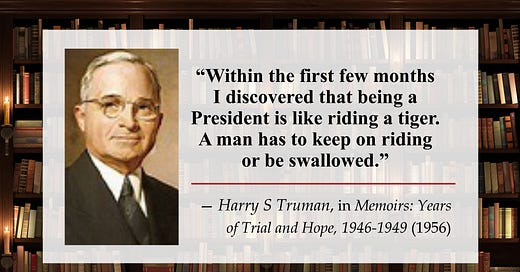



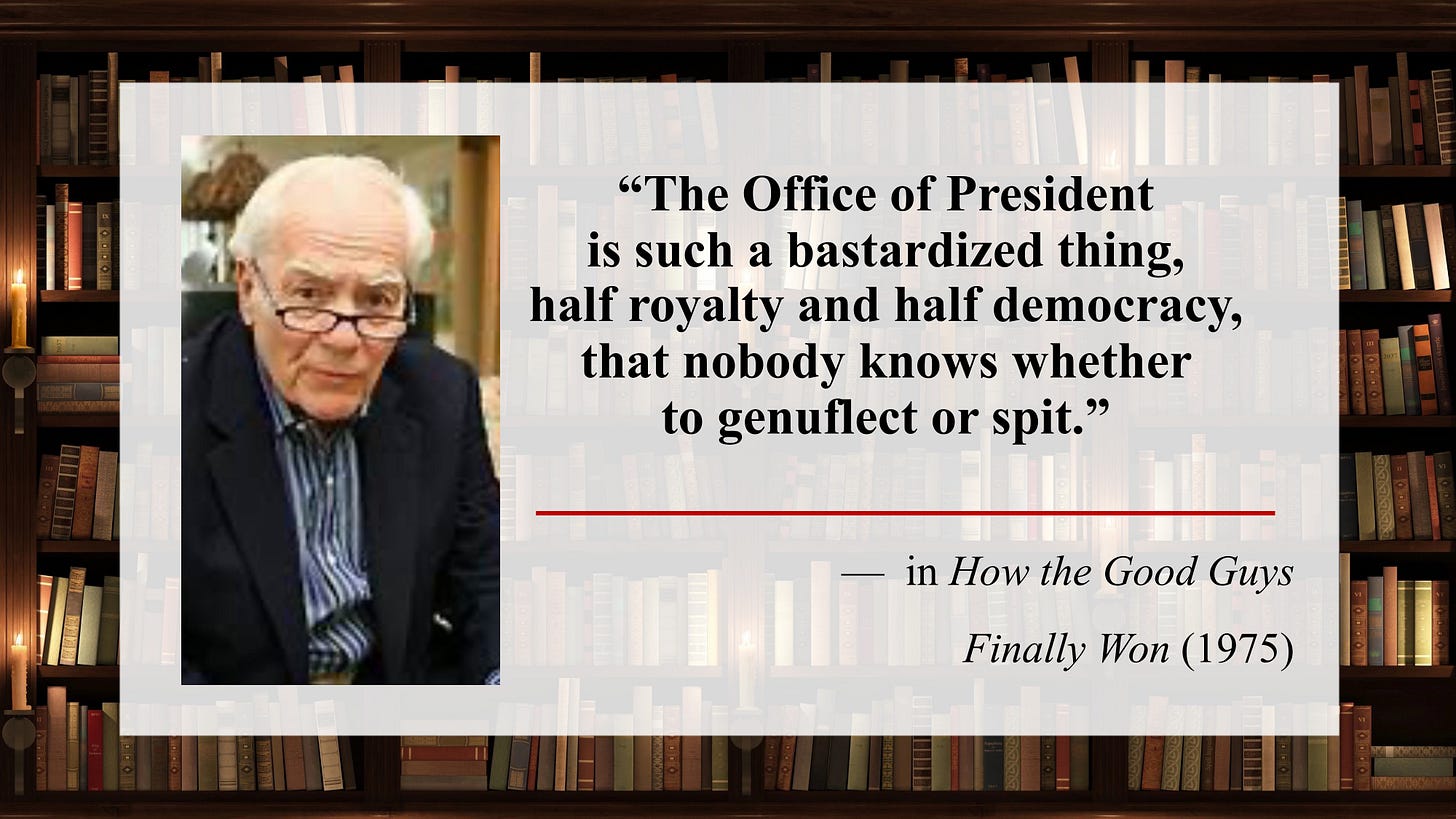



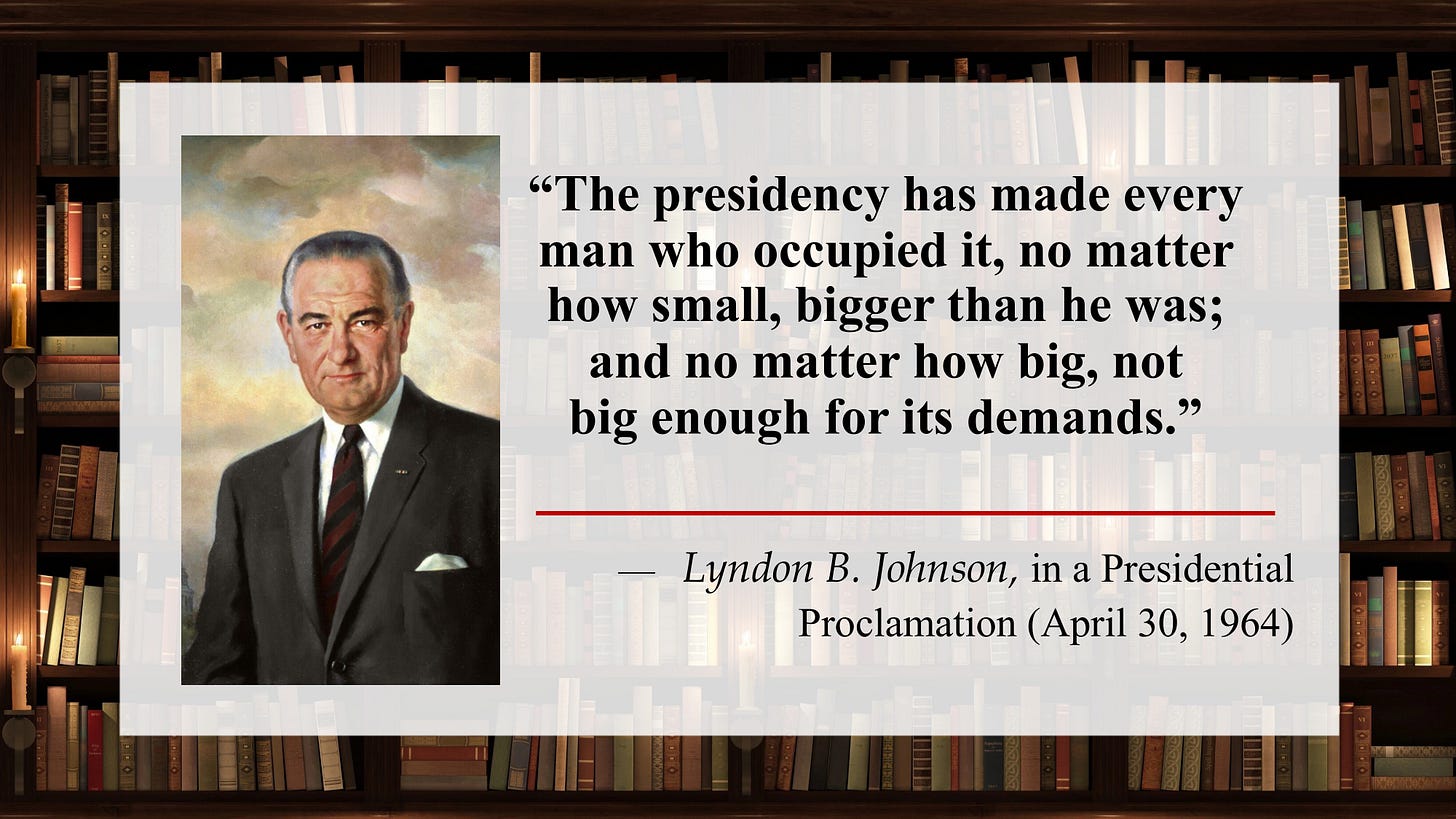
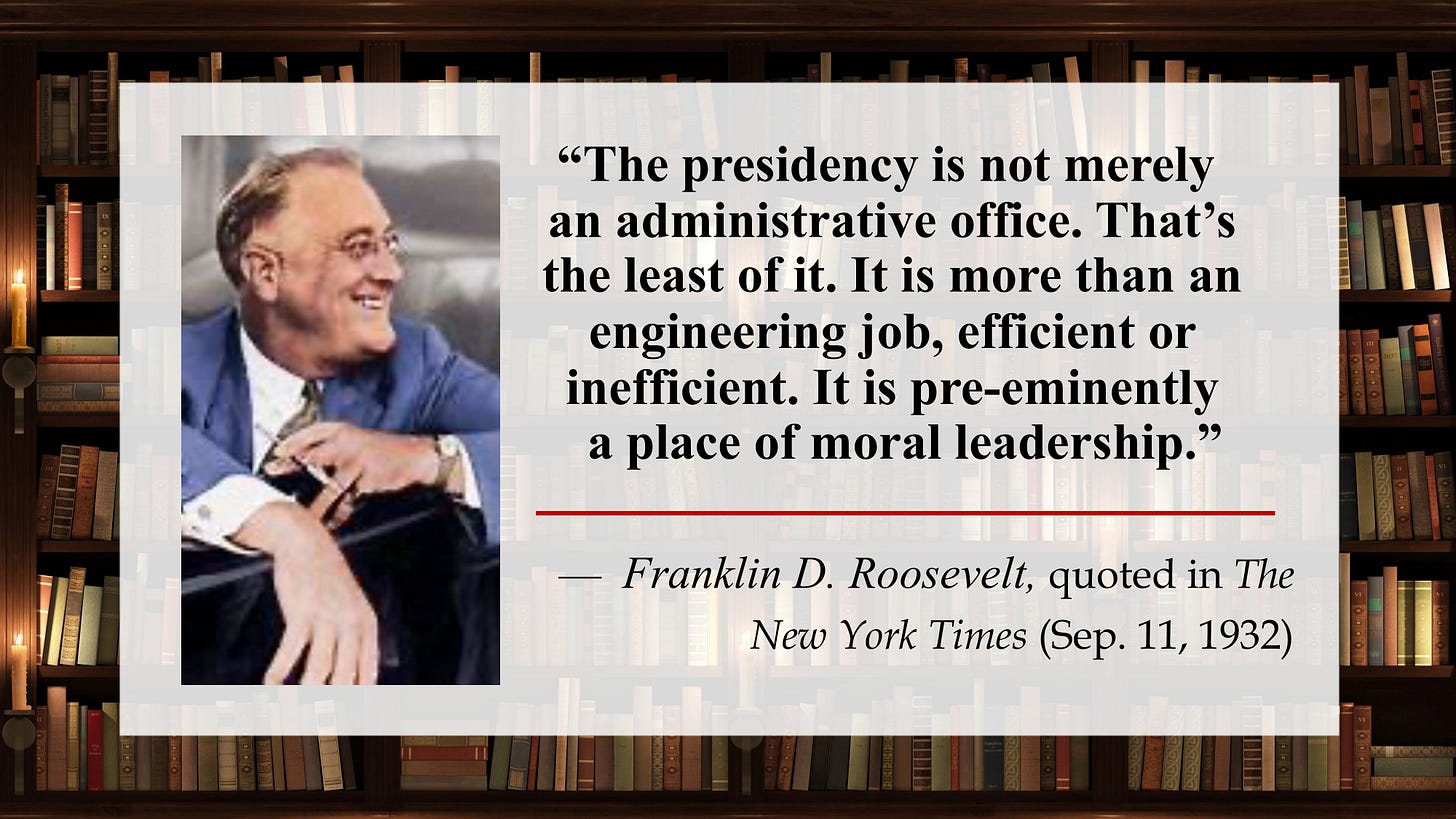


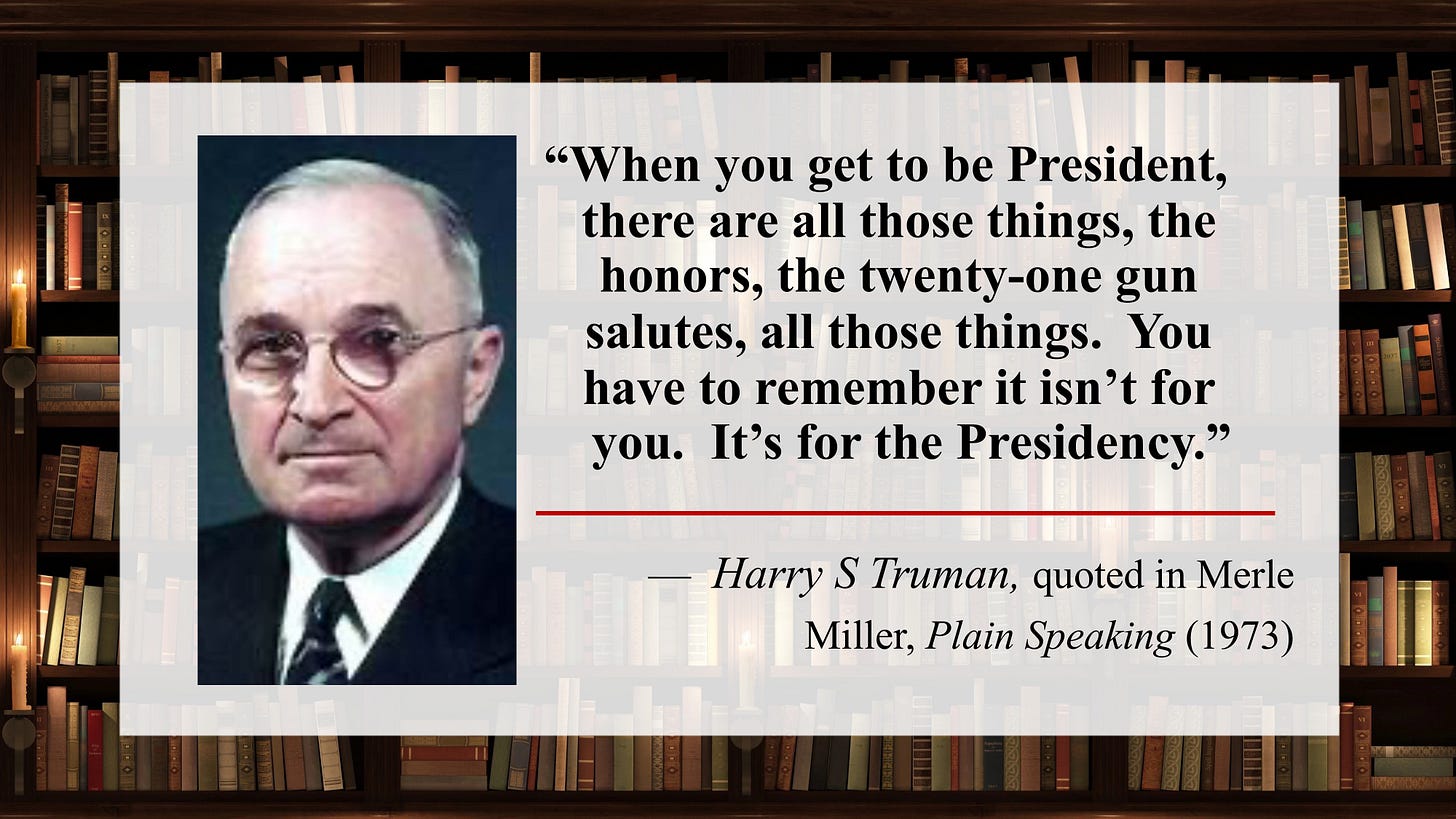
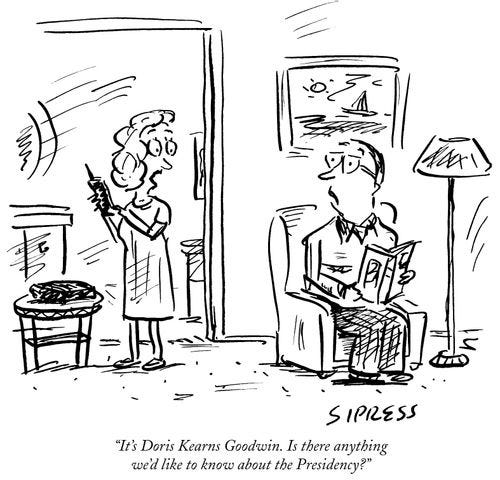
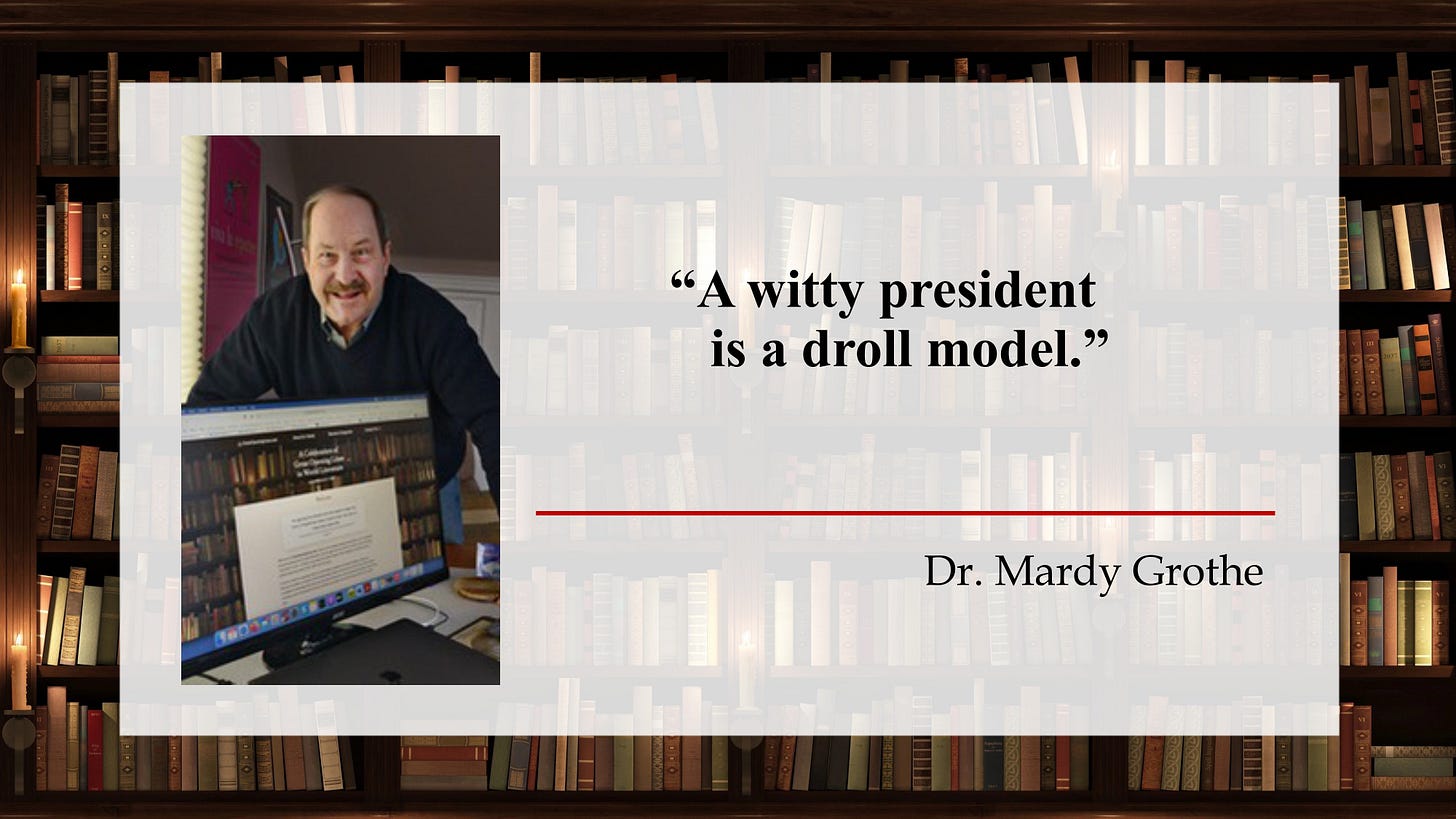
A timely collection of quotes about the office of U.S. President. Disheartening to note that our nation has gone from a president who could not tell a lie to a presidential candidate (and ex-president) who cannot tell the truth.
Fascinating collection of quotes and information. Such a wide variety of thoughts from very smart people. Thank you for putting it all together!